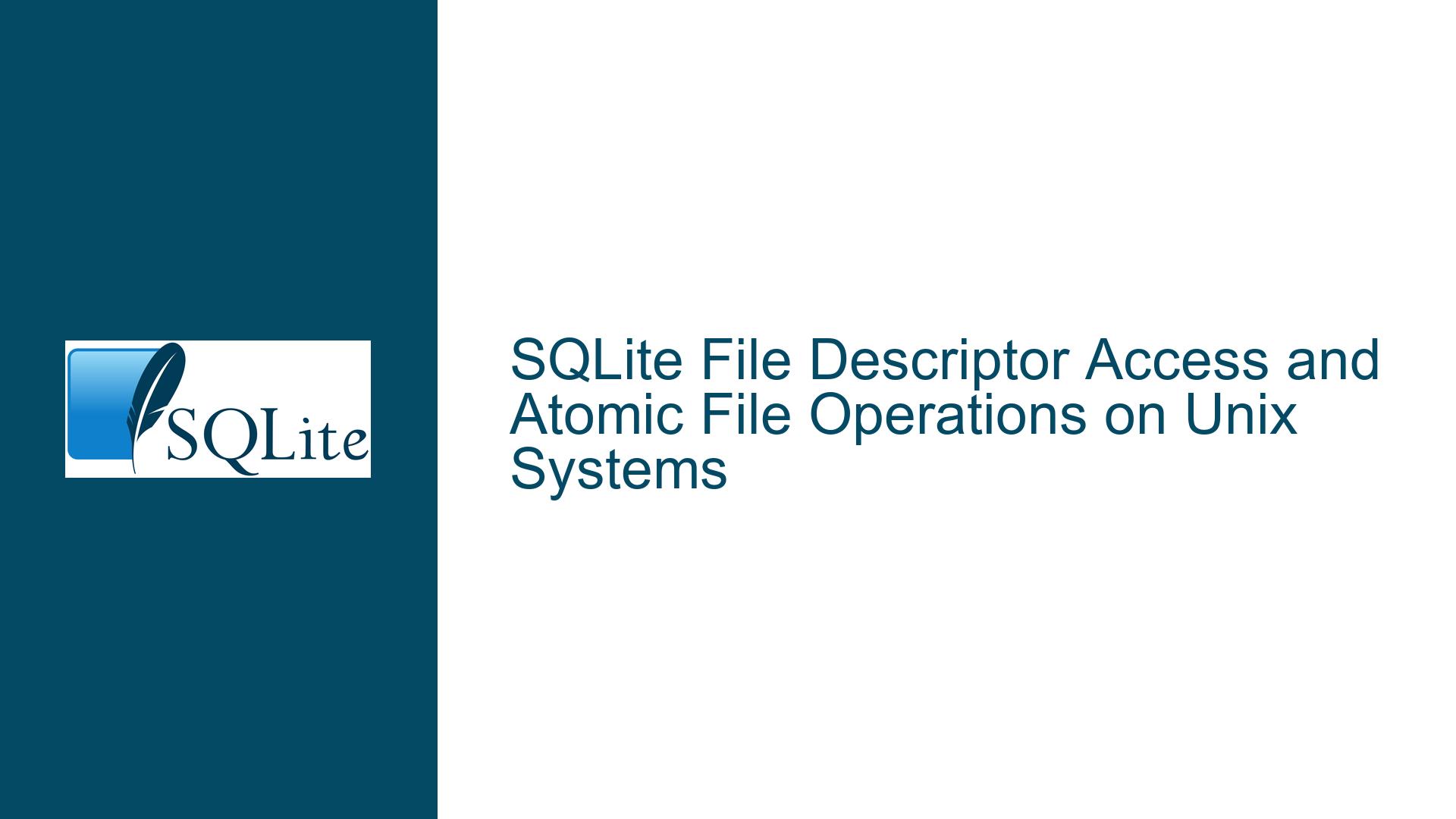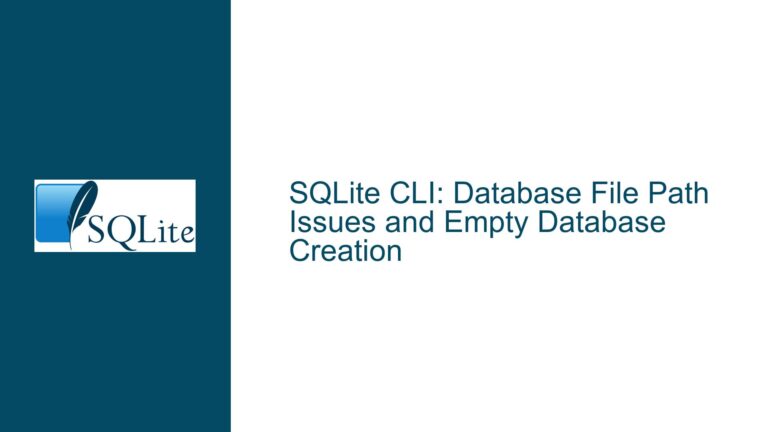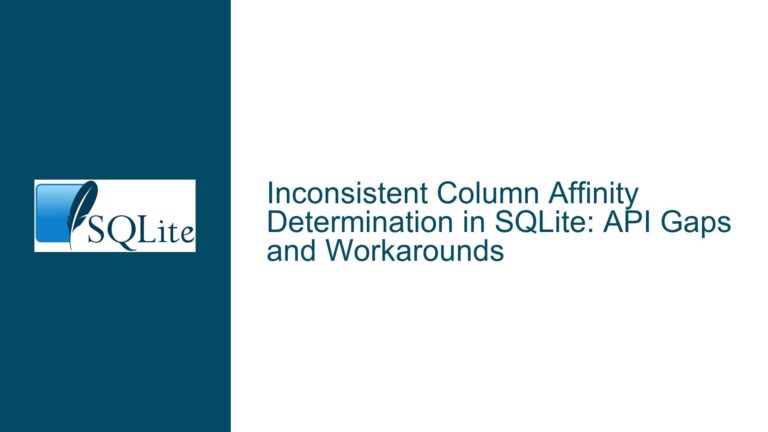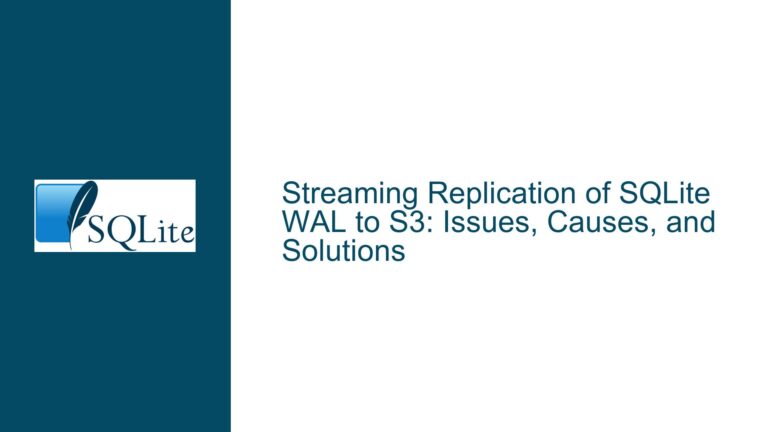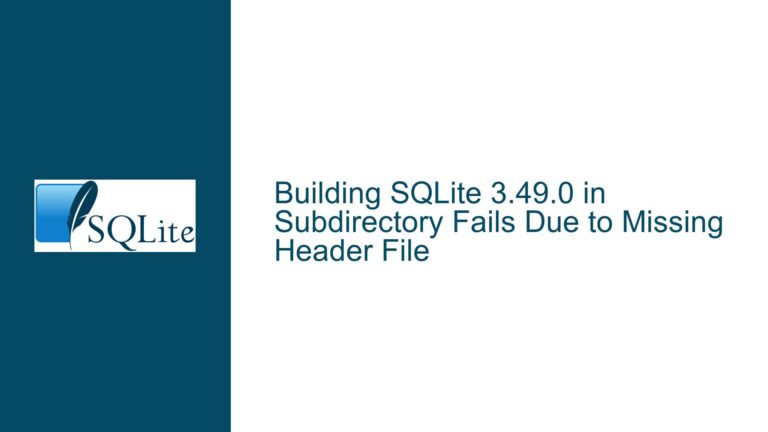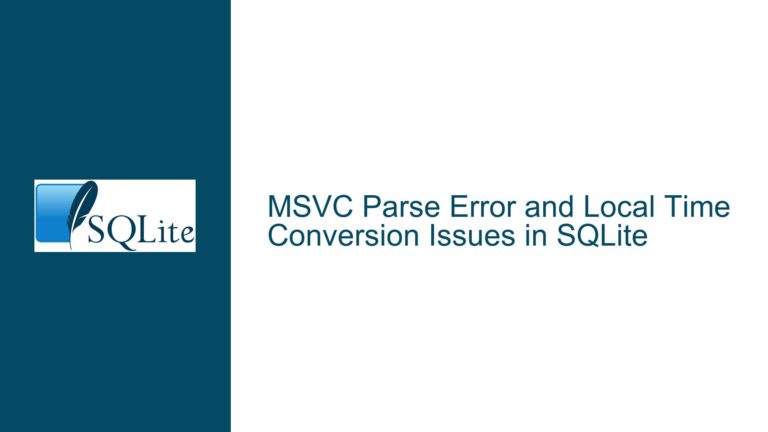SQLite File Descriptor Access and Atomic File Operations on Unix Systems
SQLite_FCNTL_WIN32_GET_HANDLE and Unix File Descriptor Access
The core issue revolves around the need for a Unix-compatible equivalent of the SQLITE_FCNTL_WIN32_GET_HANDLE opcode in SQLite. This opcode, introduced in SQLite 3.15.1, allows developers to retrieve the underlying file handle of a SQLite database on Windows systems. However, there is no analogous functionality for Unix-based systems, which limits the ability to perform certain atomic file operations and verification tasks.
The primary use case for this functionality is to ensure atomicity when opening a SQLite database file. Specifically, developers want to:
- Open a new database file and ensure the operation fails if the file already exists.
- Open a database file that may or may not exist, with the ability to determine whether the file was newly created.
Currently, SQLite’s API does not provide direct support for these operations. While it is possible to use the operating system’s filesystem API to check for the existence of a file and then open it with SQLite, this approach is not atomic. There is a race condition between the existence check and the actual opening of the file, which could lead to inconsistencies.
To address this, developers have proposed adding a Unix-specific opcode, SQLITE_FCNTL_UNIX_GET_FD, which would allow retrieval of the underlying file descriptor for a SQLite database on Unix systems. This would enable developers to verify that the file opened via the filesystem API is the same as the one used by SQLite, by comparing device and inode numbers. However, this approach has potential pitfalls, particularly concerning POSIX advisory locks and file descriptor management.
Race Conditions and File Descriptor Management in Unix Systems
The lack of a Unix equivalent for SQLITE_FCNTL_WIN32_GET_HANDLE introduces several challenges, primarily related to race conditions and file descriptor management. When a developer attempts to open a SQLite database file using the filesystem API and then verifies its identity using SQLite, there is a risk of race conditions. For example, another process could create or delete the file between the existence check and the SQLite open operation, leading to inconsistencies.
Additionally, managing file descriptors in Unix systems requires careful consideration of POSIX advisory locks. POSIX advisory locks are associated with file descriptors, and closing a file descriptor releases any locks held by that descriptor. This behavior can lead to unexpected issues if a file descriptor is closed prematurely, as it may release locks that are still needed by SQLite.
The proposed SQLITE_FCNTL_UNIX_GET_FD opcode would allow developers to retrieve the file descriptor used by SQLite, enabling them to perform necessary verifications. However, this approach must be implemented carefully to avoid releasing locks or causing other unintended side effects. Developers must ensure that any file descriptors obtained via this opcode are managed correctly, particularly in multi-threaded or multi-process environments.
Implementing SQLITE_FCNTL_UNIX_GET_FD and Ensuring Atomicity
To address the issues outlined above, the following steps can be taken to implement SQLITE_FCNTL_UNIX_GET_FD and ensure atomic file operations in Unix systems:
Add Unix-Specific Opcode: Introduce a new opcode,
SQLITE_FCNTL_UNIX_GET_FD, in the SQLite source code. This opcode would function similarly toSQLITE_FCNTL_WIN32_GET_HANDLE, allowing developers to retrieve the underlying file descriptor for a SQLite database on Unix systems. The implementation would involve modifying theunixFileControlfunction insrc/os_unix.cto handle the new opcode.File Descriptor Verification: Once the file descriptor is retrieved, developers can use system calls such as
fstatto obtain the device and inode numbers for the file. These values can then be compared with those of the file opened via the filesystem API to verify that they refer to the same file. This verification step ensures that the file opened by SQLite is the same as the one checked for existence, eliminating race conditions.File Descriptor Management: Care must be taken to manage file descriptors correctly to avoid releasing POSIX advisory locks prematurely. Developers should avoid closing the file descriptor obtained via
SQLITE_FCNTL_UNIX_GET_FDunless absolutely necessary. Instead, they should rely on SQLite’s internal file management mechanisms to handle the descriptor’s lifecycle.Atomic File Creation: To ensure atomic file creation, developers can use the
O_EXCLflag with theopensystem call when creating a new file. This flag ensures that the call fails if the file already exists, providing atomicity. Once the file is created, SQLite can be instructed to open the file using theSQLITE_OPEN_CREATEflag, which allows the creation of a new file if it does not exist.Error Handling and Recovery: Implement robust error handling to manage cases where file operations fail or race conditions are detected. This includes checking return values from system calls and SQLite functions, and providing appropriate feedback to the user or application.
Testing and Validation: Thoroughly test the new functionality in various scenarios, including multi-threaded and multi-process environments, to ensure that it behaves as expected and does not introduce new issues. This includes testing for race conditions, file descriptor management, and POSIX advisory lock behavior.
By following these steps, developers can implement SQLITE_FCNTL_UNIX_GET_FD and ensure atomic file operations in Unix systems, addressing the limitations of the current SQLite API and providing a more robust solution for file management.
Conclusion
The lack of a Unix equivalent for SQLITE_FCNTL_WIN32_GET_HANDLE in SQLite presents challenges for developers who need to perform atomic file operations and verify file identities. By introducing SQLITE_FCNTL_UNIX_GET_FD and carefully managing file descriptors, developers can achieve the desired functionality while avoiding race conditions and other pitfalls. This approach requires careful implementation and testing to ensure that it works correctly in all scenarios, but it provides a valuable tool for developers working with SQLite on Unix systems.
